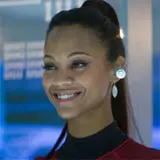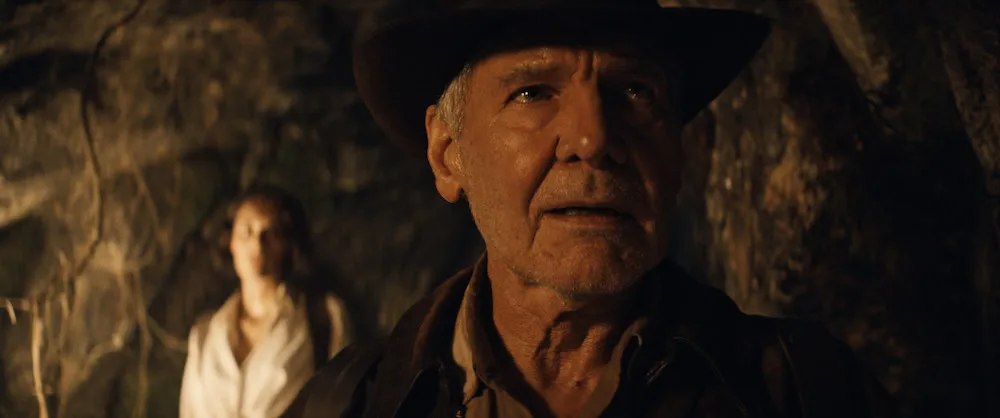 Space is no longer the final frontier for the Starship Enterprise. A franchise reboot is.
Space is no longer the final frontier for the Starship Enterprise. A franchise reboot is.
After taking a near seven-year break from the big screen, the cash cow that Gene Rodenberry built for Paramount has returned via the franchise reset Star Trek, directed by Lost and Alias wunderkind J.J. Abrams. With an entirely new cast and production crew in place, the question arises: Does the new $150 million or more film boldly go into the realm of the great Trek entertainments like The Wrath of Khan, or is it one of those forgettable entries like The Final Frontier or Nemesis that displays less life than one of William Shatner’s wigs?
The film begins with a huge bang, a knockout prologue that chronicles the birth of James T. Kirk and the death of his father, a Starship Captain (for twelve minutes), all during a surprise attack by a renegade Romulan named Nero (Eric Bana). Flash forward a quarter of a century to Iowa where we find Kirk (played as an adult by Chris Pine) has grown up to be a cocky, devil-may-care genius with a pretty serious chip on his shoulder. Following a bar fight he has with a quartet of Starfleet cadets one night, he meets a Starfleet Captain named Pike (Bruce Greenwood) who suggests that Kirk join Starfleet and try to do a better job than his pop did on the day he was born.
Kirk takes Pike up on his challenge and joins the Academy. It is here where Kirk begins to encounter the usual series suspects, including a brash doctor named Leonard McCoy (Karl Urban), a sexy linguistics officer named Uhura (Zoe Saldana), and a half-Vulcan, half-human named Spock (Zachary Quinto), a fellow cadet who believes that Kirk cheated on a test that he created to be a no-win scenario.
As Kirk faces suspension from the Academy for his so-called “cheating,” a distress call is received from Vulcan, Spock’s home planet. After sneaking on board the Enterprise, Kirk soon realizes that the distress call is a trap whose parameters are quite similar to the one that cost his father his life decades ago.
In the realm of Star Trek fandom, a friend of mine best summed up my level of “fandom”: I am a fan when it is good. This observation applies to the majority of the episodes I have seen from the original television series and, with the exception of the dire Star Trek V, the half-dozen film entries spanning 1979 to 1991 (yes, that includes the first one). For Trek to succeed with me, it has to follow a fairly simple formula: have a good story to tell, give the characters some interesting interaction and throw in the occasional kick-ass action sequence. The “Original Crew” film series had this formula down pretty well with 1982’s The Wrath of Khan and 1991’s Undiscovered Country being the standouts. Unfortunately, the quartet of Next Generation that spanned from 1993 to 2002 sadly had little, if any, of this winning formula (1996’s First Contact being the exception).
For this third generation of “Film Trek,” the winning formula has returned in a big, big way. Using a solid screenplay by Transformers scribes Roberto Orci and Alex Kurtzman as his foundation, Abrams presents a new, vibrant and more mainstream-accessible version of the classic Trek without alienating the legions of long-standing fans, giving them legions of classic Trek-isms.
With his last film, 2006’s Mission: Impossible III, Abrams tried to balance human drama with high-tech action and produced mixed results. Mediocre scripts will do that. With Star Trek, however, he achieves that balance. With the assist of some astounding visual effects and a dynamic music score by Michael Giacchino, the action sequences are among the best in the series that are professionally executed but never overshadow the story or characters, the latter who feel real and whose interactions among one another come across as genuine. This helps give the film an emotional depth rarely seen in Star Trek, be it television or film.
While breathing new life into a 43-year old franchise is difficult enough, finding an acceptable group of actors to fill the shoes of these iconic characters played by actors so identifiable in these roles is even more of a challenge. But once again, Abrams succeeds by perfectly matching the actors to the characters. Pine displays a nice mix of cockiness and arrogance to make for a fine Kirk. Quinto excels as Spock whose internal conflict serves as the film’s emotional core; while Karl Urban is pitch-perfect as the abrasive McCoy. DeForrest Kelly would be proud. Despite reduced screen time, Simon Pegg (Scotty), John Cho (Sulu), Anton Yelchin (Checkov) and Zoe Saldana each do just fine helping to solidify the ensemble as the new “Magnificent Seven” in outer space.
Bana makes for a decent villain even if his Nero is not in the same league as Ricardo Montalban’s Khan or Christopher Plummer’s Shakespeare-quoting Chang from Undiscovered Country. Winona Ryder and Ben Cross are fine as Spock’s parents, while Bruce Greenwood gives his Commander Pike a nice combination of authority and fatherliness. As for the sole returning cast member from the original series, it is great to see Leonard Nimoy make a welcome return as… well, you know.
You do not need the knowledge to differentiate between a Klingon and a Tribble, quote episodes verbatim or dress up in a costume two sizes too small to enjoy the new Star Trek. All you have to do is sit back and have a good time. Simply put, this is the most fun I have had at a movie since The Dark Knight eight months ago. Star Trek is easily one of the year’s best entertainments, and one whose sequel can’t come fast enough.
-Shawn Fitzgerald


